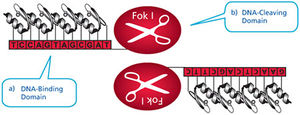Zinc Finger Nuclease (ZFN): Difference between revisions
| Line 34: | Line 34: | ||
[Sample reference] [http://ijs.sgmjournals.org/cgi/reprint/50/2/489 Takai, K., Sugai, A., Itoh, T., and Horikoshi, K. "''Palaeococcus ferrophilus'' gen. nov., sp. nov., a barophilic, hyperthermophilic archaeon from a deep-sea hydrothermal vent chimney". ''International Journal of Systematic and Evolutionary Microbiology''. 2000. Volume 50. p. 489-500.] | [Sample reference] [http://ijs.sgmjournals.org/cgi/reprint/50/2/489 Takai, K., Sugai, A., Itoh, T., and Horikoshi, K. "''Palaeococcus ferrophilus'' gen. nov., sp. nov., a barophilic, hyperthermophilic archaeon from a deep-sea hydrothermal vent chimney". ''International Journal of Systematic and Evolutionary Microbiology''. 2000. Volume 50. p. 489-500.] | ||
[http://www.nature.com/nbt/journal/v23/n8/abs/nbt1125.html Porteus, M. H. and Carroll, D. Gene targeting using zinc finger nucleases. Nature Biotechnology. 2005. Volume 23. p. 967-973.] | [http://www.nature.com/nbt/journal/v23/n8/abs/nbt1125.html Porteus, M. H. and Carroll, D. "Gene targeting using zinc finger nucleases". ''Nature Biotechnology''. 2005. Volume 23. p. 967-973.] | ||
Revision as of 02:56, 8 November 2013
Introduction
Zinc finger nucleases (ZFNs)are tools which can be used to cleave DNA at selected points. At right is a sample image insertion. It works for any image uploaded anywhere to MicrobeWiki. The insertion code consists of:
Double brackets: [[
Filename: PHIL_1181_lores.jpg
Thumbnail status: |thumb|
Pixel size: |300px|
Placement on page: |right|
Legend/credit: Electron micrograph of the Ebola Zaire virus. This was the first photo ever taken of the virus, on 10/13/1976. By Dr. F.A. Murphy, now at U.C. Davis, then at the CDC.
Closed double brackets: ]]
Other examples:
Bold
Italic
Subscript: H2O
Superscript: Fe3+
Section 1
Include some current research in each topic, with at least one figure showing data.
Section 2
Include some current research in each topic, with at least one figure showing data.
Section 3
Include some current research in each topic, with at least one figure showing data.
Conclusion
Overall paper length should be 3,000 words, with at least 3 figures.
References
Edited by student of Joan Slonczewski for BIOL 238 Microbiology, 2009, Kenyon College.

